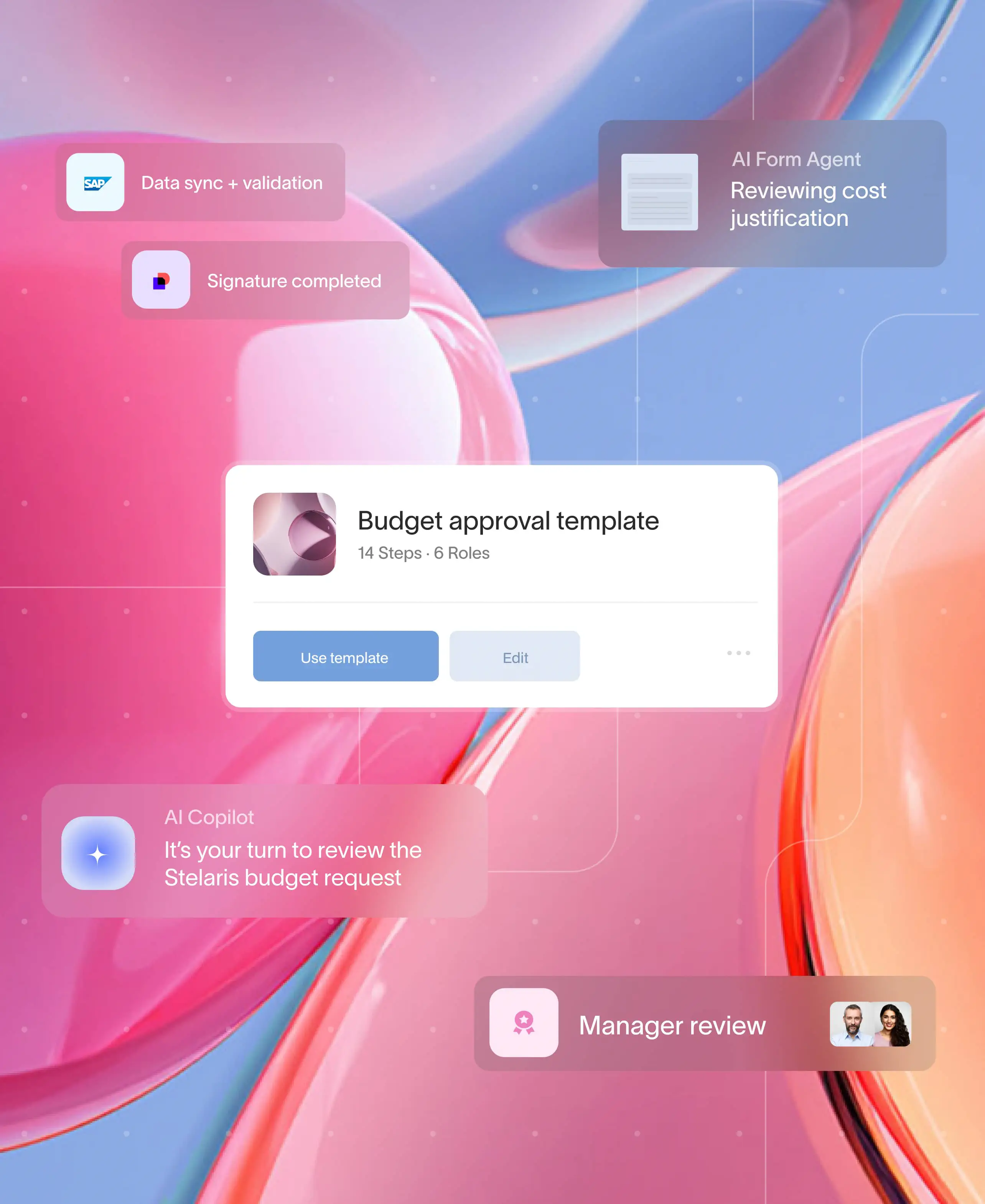.webp)
At a glance
Client management processes must meet strict compliance standards, especially in regulated industries.
Requirements like KYC, SOC 2, and GDPR demand verified access, traceable approvals, and documented interactions.
Manual tracking makes compliance time-consuming and error-prone.
Moxo embeds compliance directly into client workflows with audit trails, encryption, and identity-based access.
Why compliance in client management matters
In 2023, global financial institutions paid over $5 billion in fines for AML and KYC failures (Thomson Reuters). Healthcare providers in the United States alone faced $36 million in HIPAA-related penalties (HHS). These fines highlight systemic weaknesses in how firms manage compliance within client processes.
The challenge is not understanding regulations but executing them consistently. Client onboarding, approvals, and collaboration often happen across emails, spreadsheets, and disjointed tools. The result: incomplete audit trails, overexposed data, and retention failures.
PwC reports that 70% of compliance failures trace back to process breakdowns, not lack of knowledge. This makes workflow design and execution the critical factor.
Let’s explore what compliance-ready client management workflows look like—and then show how Moxo operationalizes KYC, audit logging, permissions, and archiving.
Compliance scenarios in client management
KYC and AML in financial services
Banks, wealth managers, and accounting firms must verify identities, check against sanctions lists, and prove due diligence. A Deloitte survey found 57% of compliance officers cited data fragmentation as the biggest barrier to effective KYC.
Without structured workflows, firms risk missing documents or failing to update expired IDs. With secure client onboarding workflows, every document upload, review, and approval is captured in an audit-ready log.
Case study: A financial services firm using Moxo cut KYC onboarding time by 54% while reducing client drop-offs by 81%. By embedding secure file collection and approval into branded client portals, they streamlined compliance without adding friction.
SOC 2 in consulting and SaaS
Consulting and SaaS firms face scrutiny over data handling practices. SOC 2 requires access control, audit logs, and retention policies. PwC notes that SOC 2 failures often stem from inconsistent access management.
By embedding role-based permissions inside Moxo’s client portals, firms ensure clients only see their deliverables, while staff access only what they need. Audit logs automatically capture who viewed or edited a file. During audits, firms can export a complete activity history.
Case study: A consulting firm used Moxo’s structured collaboration flows to remain SOC 2 compliant while reducing project documentation errors by 35%.
HIPAA in healthcare
Healthcare organizations must safeguard protected health information (PHI). HIPAA violations cost the industry $1.9 billion in settlements between 2000 and 2023 (HIPAA Journal).
With Moxo, encrypted workflows ensure PHI is exchanged securely. Audit logs track every access, while retention rules dictate when patient records are archived or deleted.
Case study: A healthcare provider used Moxo to manage patient onboarding. They achieved HIPAA compliance while reducing intake times from weeks to days. Patients accessed their workflows via Magic Links, eliminating portal adoption barriers.
Strengthen compliance with robust access controls
In any client management process, controlling who can access sensitive information is fundamental to compliance. Implementing strong permission settings and secure authentication methods ensures that client data remains confidential and is only accessible to authorized individuals. This is not just a best practice; it's a critical component of meeting KYC, AML, and other regulatory requirements.
Key features for secure access control:
Role-based access control (RBAC): Prevents data overexposure by assigning specific roles to users. This limits who can view, edit, or manage sensitive files based on their job function, ensuring employees and clients only interact with the information relevant to them.
Single sign-on (SSO) & SAML authentication: Centralize and simplify identity management. SSO/SAML allows users to access multiple applications with a single set of credentials, enabling your organization to enforce consistent and strong access policies across all systems, which is crucial for maintaining a secure and compliant environment.
Least privilege access: Grant users the minimum level of access necessary to perform their job duties. This principle ensures that staff and clients see only what they absolutely need to, drastically reducing the risk of unauthorized data exposure.
Secure client portals: Use dedicated portals that create siloed environments for each client. For example, a consulting firm using a secure client portal can guarantee that client A only views their own deliverables and has no visibility into client B's files, while compliance officers maintain complete oversight with full audit visibility.
According to Gartner, weak identity management is a top security risk for enterprises. By embedding SSO/SAML policies and granular access controls into your client workflows, you significantly reduce this risk and build a foundation of trust and security.
Audit trails & exports
Regulators demand proof of process. Audit trails provide it.
- Immutable logging captures every upload, approval, and signature with timestamps.
- Version control preserves document histories.
- Exportable reports simplify audit prep, reducing time and human error.
An accounting firm using Moxo’s workflows reduced audit preparation from three weeks to three days.
A G2 reviewer wrote: “The audit trail feature is a lifesaver—our compliance team no longer dreads audits.”
Audit trails: Your proof of compliance
Regulators demand proof of process, especially for client management and KYC compliance. Audit trails provide that proof, giving you confidence and saving you time.
Immutable logging: Every action, from document uploads and approvals to client signatures, is captured with unchangeable timestamps. This creates a transparent record for KYC and compliance checks.
Version control: Easily track and preserve all document histories, ensuring you always have access to the exact version used at any point in the client journey.
Exportable reports: Simplify audit preparation with reports that are quick to generate and easy to understand, significantly reducing manual effort and potential errors.
Real-world impact: An accounting firm drastically cut its audit preparation time from three weeks to just three days by integrating Moxo’s workflows. A G2 reviewer noted, "The audit trail feature is a lifesaver—our compliance team no longer dreads audits."
Streamlined archiving & retention for KYC & audit trails
For robust client management process compliance, particularly with stringent KYC regulations and the need for comprehensive audit trails, effective archiving and retention of client data are non-negotiable. Regulatory bodies mandate records be preserved for 5–7 years, while privacy laws like gdpr and HIPAA impose deletion obligations when data is no longer necessary. Manual management of these often-conflicting requirements significantly increases risk.
Integrating automated solutions into your client management platform can seamlessly address these complexities:
Automated archiving: Sync all client records, including KYC documents, communication logs, and signed agreements, into secure platforms like SharePoint, Box, or dedicated compliance vaults. This creates a tamper-proof, readily accessible audit trail.
Intelligent retention: Automatically move files to designated long-term storage once a client process is complete or a specific regulatory retention period is met, safeguarding critical data for future audits.
Privacy-compliant deletion: Trigger automated deletion of data when it is no longer legally required, ensuring adherence to privacy regulations and reducing data liability.
How this supports KYC and audit trails:
KYC compliance: Ensures every piece of collected KYC documentation, verification step, and ongoing monitoring record is securely stored and instantly retrievable for regulatory reviews, proving due diligence.
Comprehensive audit trails: Provide an immutable, time-stamped record of every client interaction, document version, and decision, crucial for demonstrating compliance and accountability to auditors.
For instance, a financial institution using Moxo’s platform for client onboarding could automatically archive all verified KYC documents and client communications immediately after account opening. This not only provided an indisputable audit trail for regulatory compliance but also streamlined operational workflows, reducing storage costs by 20% while upholding GDPR standards.
Configure a compliant flow in Moxo
Building compliance-ready workflows isn’t just about following regulations — it’s about ensuring every step is traceable, secure, and automated. Moxo makes this easy by turning complex approval and documentation processes into structured, auditable flows.
Here’s what a compliance-ready flow looks like inside Moxo workflows:
- Intake – Clients securely upload KYC documents via an encrypted portal.
- Approval – Compliance officers review submissions with role-based access; all approvals are logged automatically.
- Audit Trail – Immutable logs record who did what, when, and from where, ensuring end-to-end accountability.
- Archiving – Completed records automatically move into designated retention systems for easy retrieval and audit readiness.
A built-in compliance checklist ensures nothing slips through the cracks:
- KYC data collected and verified securely.
- Role-based access controls enforced.
- SSO/SAML authentication enabled for identity management.
- Immutable audit logs generated and exportable.
- Retention and archiving policies integrated into workflows.
This flow ensures regulatory alignment across industries like finance, legal, and consulting — while minimizing manual oversight and error.
Case study: A global wealth management firm configured this compliance flow in Moxo and reduced audit preparation time by 65%, while achieving a higher client satisfaction score due to transparent documentation and faster turnaround.
In Moxo, compliance becomes proactive — not reactive. Every interaction is secure, logged, and auditable by design, ensuring peace of mind for both clients and regulators.
Traditional tools vs. Moxo
Traditional tools expose organizations to compliance blind spots. Moxo makes workflows secure, auditable, and regulator-ready.
How Moxo helps
Compliance and client experience shouldn’t compete. Moxo brings both together through secure, auditable workflows.
Using workflow automation, teams can collect KYC/KYB documents, trigger approvals, and track reviews. Document workflows store and verify files with full traceability.
Security and compliance features support SOC 2, GDPR, and encryption standards, while audit trails record every client action. Client portals keep collaboration transparent without exposing sensitive data.
Moxo enables compliance-by-design for client processes—ensuring privacy, accountability, and trust at every step of the relationship.
Turning compliance into a competitive edge
Compliance is a strategic advantage. Firms that embed compliance into their client management process through structured workflows, role-based access, audit trails, and archiving integrations not only meet regulatory requirements but also enhance operational efficiency. The results speak for themselves: faster onboarding, reduced client drop-offs, and smoother audits.
By leveraging Moxo’s all-in-one client interaction hub, organizations can confidently operationalize compliance while delivering a seamless, professional experience that builds trust.
See how Moxo can transform your client management and compliance workflows—book a demo today to experience it in action.
FAQs
What does client management process compliance include?
It covers KYC, secure document handling, audit trails, and data retention. With Moxo, these steps are built into workflows, reducing manual oversight.
How does Moxo help with KYC requirements?
Yes, Moxo provides secure document collection for KYC files. Clients upload files safely, and compliance officers review them with full audit logs.
Can Moxo support SOC 2 or HIPAA compliance?
Definitely. Moxo enforces role-based access, SSO, and audit-ready logs, making it suitable for SOC 2 in consulting and HIPAA in healthcare.
Why are audit trails so important in compliance?
Audit trails prove “who did what and when.” Moxo automates this with immutable logs that can be exported during regulatory reviews.
How does Moxo handle long-term record retention?
Moxo integrates with archiving solutions like SharePoint and Box. Records move automatically into secure storage, ensuring compliance with retention laws.






